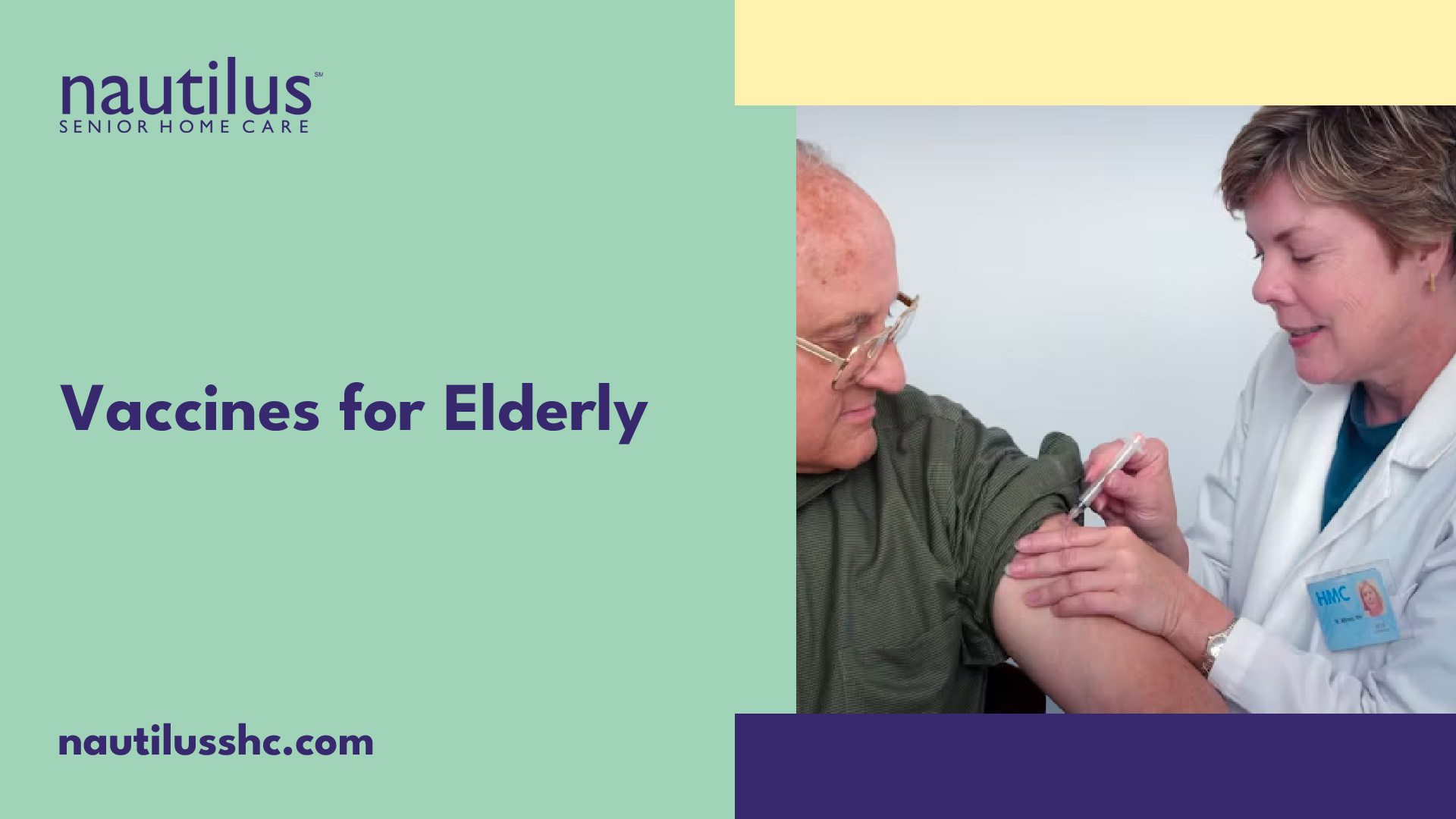Importance of Vaccines for the Elderly
As individuals age, their immune system undergoes changes that can make them more susceptible to certain diseases. Vaccines play a crucial role in protecting the health and well-being of the elderly population. In this section, we will explore why vaccines are crucial in later life and delve into the understanding of the aging immune system.

Why Vaccines Are Crucial in Later Life
Vaccines are essential for the elderly population as they help prevent the occurrence of infectious diseases and their potentially severe consequences. There are several reasons why vaccines are crucial for older adults:
- Reduced Immune Response: The immune system naturally weakens with age, making it more difficult for the body to fight off infections. Vaccines help stimulate the immune response, enabling the body to recognize and combat pathogens more effectively.
- Higher Risk of Complications: Older adults are more likely to experience severe complications if they contract certain diseases, such as influenza or pneumonia. Vaccines can significantly reduce the risk of hospitalization, serious illness, and even death.
- Protection for Vulnerable Populations: Vaccinating the elderly not only benefits them individually but also helps protect other vulnerable populations, such as young children or individuals with compromised immune systems. By preventing the spread of diseases, vaccines contribute to community immunity.
Understanding the Aging Immune System
To comprehend the importance of vaccines for the elderly, it is vital to understand how the immune system changes as individuals age. Here are some key aspects:
- Immunosenescence: Immunosenescence refers to the gradual decline in immune function that occurs with age. This decline can result in a reduced response to infections and vaccinations. Vaccines specifically designed for older adults help overcome this diminished immune response.
- Decreased Vaccine Effectiveness: The aging immune system may not respond to vaccines as robustly as it did in younger years. This reduced effectiveness can make older adults more susceptible to vaccine-preventable diseases. However, receiving recommended vaccines can still provide significant protection.
- Immune Memory: The immune system develops memory cells that remember specific pathogens encountered before. Over time, the immune memory may decline, making it important for the elderly to receive booster shots or additional doses of vaccines to maintain protection.
Understanding the changes in the aging immune system emphasizes the importance of vaccines for the elderly. By ensuring that older adults receive the recommended vaccines, we can help protect their health, reduce the risk of complications, and enhance their overall quality of life.
Vaccines Recommended for the Elderly
As individuals age, their immune system may weaken, making them more susceptible to certain infections and diseases. Vaccines play a crucial role in protecting the health of the elderly by boosting their immune response. Here are three vaccines that are particularly recommended for the elderly:
Influenza (Flu) Vaccine
The influenza (flu) vaccine is highly recommended for the elderly as they are at a higher risk of developing severe complications from the flu. The flu virus can lead to hospitalization and even death in older adults. By getting the annual flu vaccine, seniors can significantly reduce their risk of contracting the flu and its associated complications.
It’s important to note that the flu vaccine is updated each year to match the most prevalent strains of the virus. This ensures that the vaccine provides optimal protection against the specific flu strains circulating each flu season. Vaccination is typically recommended in the fall before the flu season begins.
Pneumococcal Vaccine
The pneumococcal vaccine is designed to protect against pneumococcal diseases, including pneumonia, bloodstream infections, and meningitis. These diseases can be severe and life-threatening, particularly for older adults. The pneumococcal vaccine helps to prevent such infections by targeting the bacteria responsible for these illnesses.
There are two types of pneumococcal vaccines recommended for the elderly:
- Pneumococcal conjugate vaccine (PCV13): This vaccine is recommended for all adults aged 65 years and older. PCV13 provides protection against 13 strains of pneumococcal bacteria.
- Pneumococcal polysaccharide vaccine (PPSV23): In addition to PCV13, the PPSV23 vaccine is also recommended for older adults. This vaccine offers protection against 23 different strains of pneumococcal bacteria.
It’s important to consult with a healthcare provider to determine the appropriate timing and schedule for receiving these vaccines.
Shingles (Herpes Zoster) Vaccine
Shingles, also known as herpes zoster, is caused by the reactivation of the varicella-zoster virus, the same virus that causes chickenpox. The risk of developing shingles increases with age, and the condition can cause chronic pain and other complications.
The shingles vaccine is recommended for adults aged 50 years and older. There are two types of shingles vaccines available:
- Shingles vaccine (recombinant, adjuvanted): This vaccine is recommended for individuals aged 50 years and older. It helps to reduce the risk of developing shingles and its associated complications.
- Shingles vaccine (live, attenuated): This vaccine is recommended for individuals aged 60 years and older. It is a single-dose vaccine that provides protection against shingles.
It’s worth noting that not all individuals are eligible for the shingles vaccine, especially those with certain medical conditions. Consultation with a healthcare provider is essential to determine if the shingles vaccine is appropriate for an individual.
By staying up to date with these recommended vaccines, the elderly can protect themselves from serious illnesses and complications, ensuring a healthier and more vibrant life. Vaccination is an important step in maintaining the well-being and longevity of our senior population.
Benefits of Vaccines for the Elderly
Vaccines play a crucial role in protecting the health and well-being of the elderly population. As individuals age, their immune system becomes more vulnerable, making them more susceptible to serious illnesses and complications. Vaccines specifically designed for the elderly can provide numerous benefits, including:
Protection Against Serious Illnesses
Vaccines for the elderly are designed to target diseases that can have severe consequences for this age group. By receiving the recommended vaccines, seniors can significantly reduce their risk of acquiring these illnesses and experiencing their potentially devastating effects. Here are some vaccines that are particularly important for the elderly:
Vaccine and Disease(s) Targeted
- Influenza (Flu) Vaccine: Influenza (flu)
- Pneumococcal Vaccine: Pneumococcal diseases, including pneumonia, meningitis, and bloodstream infections
- Shingles (Herpes Zoster) Vaccine: Shingles (herpes zoster)
Reduced Risk of Complications
In addition to protecting against the illnesses themselves, vaccines for the elderly also help reduce the risk of complications that can arise from these diseases. For example, influenza can lead to pneumonia and other respiratory infections, while shingles can cause long-lasting nerve pain. By getting vaccinated, seniors can lower their chances of developing such complications and their associated health risks.
Maintaining Independence and Quality of Life
Vaccines not only safeguard the physical health of the elderly but also contribute to their overall well-being and independence. By preventing serious illnesses and complications, vaccines can help seniors maintain their ability to perform daily activities, engage in social interactions, and enjoy a good quality of life. Vaccination empowers the elderly to live more confidently and actively, free from the limitations imposed by preventable diseases.
It’s crucial for seniors to stay up-to-date with their vaccinations and follow the recommendations provided by healthcare professionals. By doing so, they can reap the benefits of vaccines and continue to lead healthy and fulfilling lives.
Vaccine Safety and Considerations
When it comes to vaccines for the elderly, safety is of utmost importance. Vaccines are rigorously tested and monitored to ensure their safety and effectiveness. Here, we will discuss the vaccine safety for the elderly, address common myths and misconceptions, and emphasize the importance of consulting healthcare providers.
Vaccine Safety for the Elderly
Vaccines recommended for the elderly have been extensively studied and proven to be safe. The Centers for Disease Control and Prevention (CDC) and the World Health Organization (WHO) closely monitor the safety profiles of vaccines. Extensive clinical trials and post-marketing surveillance help to identify and address any potential side effects.
It is important to note that the risk of adverse reactions to vaccines is generally low. The benefits of vaccination, such as protection against serious illnesses and reduced risk of complications, far outweigh the minimal risks associated with vaccines.
Common Myths and Misconceptions
Unfortunately, there are common myths and misconceptions surrounding vaccines that can create doubts or concerns. Let’s address a few of these misconceptions:
- Myth: Vaccines can give you the disease they are designed to prevent.
Fact: Vaccines do not contain live viruses that can cause the disease. Instead, they contain either inactivated viruses or specific components that stimulate the immune system. - Myth: Vaccines are not necessary for the elderly because they already had the diseases.
Fact: Even if someone has had a particular disease in the past, their immunity may decrease over time. Vaccination helps to boost and maintain immunity, providing ongoing protection. - Myth: Vaccines can weaken the immune system.
Fact: Vaccines actually strengthen the immune system by stimulating a response to specific pathogens. This helps the body recognize and fight off those pathogens more effectively.
It is essential to rely on accurate and evidence-based information when making decisions about vaccines. Consulting reliable sources, such as healthcare providers or reputable health organizations, can help dispel any concerns or misconceptions.
Consultation with Healthcare Providers
Consulting with healthcare providers is crucial when considering vaccines for the elderly. Healthcare professionals are well-informed about the latest vaccine recommendations and can provide personalized advice based on an individual’s health status and specific needs.
During a consultation, healthcare providers can assess the individual’s medical history, allergies, and potential contraindications to vaccines. They can also address any concerns or questions, providing clear and accurate information to help individuals make informed decisions.
By consulting with healthcare providers, the elderly can receive tailored recommendations and ensure that vaccines are administered safely and effectively.
It is important to remember that vaccines are a vital tool in protecting the health and well-being of the elderly. By understanding vaccine safety, dispelling myths, and seeking guidance from healthcare providers, we can ensure that the elderly receive the benefits of vaccination and stay protected against vaccine-preventable diseases.
Promoting Vaccine Awareness and Access for the Elderly
Ensuring vaccine awareness and access among the elderly population is crucial for their health and well-being. By promoting education, providing vaccination programs, and empowering the elderly through vaccination, we can make a significant impact on their overall health outcomes.
Importance of Education and Communication
Education and communication play vital roles in promoting vaccine awareness among the elderly. It is essential to provide clear and accurate information about the benefits of vaccines, addressing any concerns or misconceptions they may have. By emphasizing the importance of vaccination in later life, we can help the elderly understand the significance of staying up-to-date with recommended vaccines.
Healthcare providers, community organizations, and caregivers can play a significant role in educating the elderly about vaccines. Offering educational materials, organizing seminars or workshops, and engaging in one-on-one conversations can help dispel myths and increase vaccine acceptance. By ensuring that the elderly have access to reliable information, we can empower them to make informed decisions about their health.
Vaccination Programs and Resources
To enhance vaccine access for the elderly, it is crucial to establish vaccination programs and provide necessary resources. These programs can be implemented in healthcare settings, community centers, or through mobile vaccination clinics, making vaccines easily accessible to the elderly population.
Collaboration between healthcare providers, government agencies, and community organizations can help identify areas where vaccine access may be limited. By targeting underserved communities and providing mobile vaccination services, we can bridge the gap and ensure that all elderly individuals have access to vaccines.
In addition to vaccination programs, it is important to provide resources that facilitate vaccine access for the elderly. This can include information on vaccine schedules, locations of vaccination sites, and assistance with appointment scheduling. By simplifying the process and reducing barriers, we can encourage the elderly to receive the necessary vaccines.
Empowering the Elderly through Vaccination
Vaccination not only protects the elderly from serious illnesses but also empowers them to maintain their independence and quality of life. By staying up-to-date with recommended vaccines, the elderly can reduce the risk of illness, hospitalization, and complications associated with vaccine-preventable diseases.
Vaccination empowers the elderly by providing them with the opportunity to take control of their health. It allows them to actively participate in their own well-being and stay connected with their communities. By promoting vaccine awareness and ensuring access, we can empower the elderly to make informed decisions about their health and lead fulfilling lives.
Promoting vaccine awareness and access for the elderly is a collective effort that involves education, resources, and empowerment. By working together, we can ensure that the elderly population receives the protection they need and continue to thrive in their later years.
Sources
Recommended Vaccines for Adults



